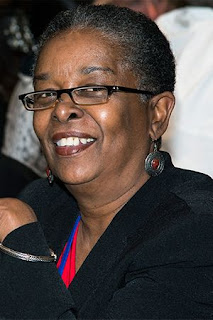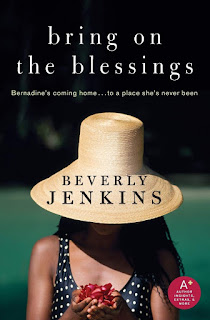In honor of Juneteenth. I am reposting this interview with Beverly Jenkins.
"Love is love. We all love. And the industry should reflect everyone." Beverly Jenkins
Beverly Jenkins calls herself a "kitchen table historian." She likens American history to a quilt with some pieces ripped out—the pieces belonging to minority history. Jenkins uses her books to weave the quilt back together by revealing patches of black history that are rarely taught in school. Slavery and the Civil Rights Movement are important pieces of African American history, but they aren't the only pieces. For example, her first three novels, Night Song, Vivid and Indigo, feature characters such as a schoolteacher, a cavalry officer, a female doctor and Underground Railroad heroes. They were all inspired by true history.Beverly Jenkins is one of my seven favorite romance authors. If you haven't yet read her, you are missing so much great romance. Beverly's historicals always enlighten me about little known historical personages and events. The knowledge serves as a wonderful background for her strong feisty heroines. Independent women for whom romance is the icing on the cake. They are already complete.
And then there's her seasoned romance series, The Blessings.
It's listed on Amazon under Contemporary Women's Fiction, Women's Domestic Life Fiction and Women's Romance Fiction. They haven't caught up to the term Seasoned Romance. Which is a shame since both my time travel romances are seasoned.
Book one of the series, Bring on the Blessings. And Yes, Because of Beverly I knew what Juneteenth was. Even though it never appeared in my history books.
If you don't know her work, you are missing so much good stuff. Right now I am reading Vivid - about the first female African American doctor in Michigan. I started it last night and I can't wait to get back to it.
Beverly Jenkins’ first romance, Night Song was published in 1994, Since then, she has been leading the charge for inclusive romance. She was featured in the documentary about the romance industry, Love Between the Covers (My sister Kelly and I rewatched this Saturday on Amazon Prime. Wonderful.)
Her forty-plus books have made her a constant darling of reviewers, fans, and her peers alike, garnering accolades for her work from the likes of The Wall Street Journal, People Magazine, and NPR. And now she has a romance movie, Deadly Sexy which you can rent on Amazon.
I messaged Beverly to see if she would be willing to be on my blog. She replied that she was on deadline but would be happy to allow me to post. After she posted that she'd sent off her book, I asked her my favorite question. The other answer came from an interview I read online.
ME: I love firsts. Can you share what it felt like to get "the Call" from your agent? From what I have been able to find online you got an agent before you got your publisher.
BJ: My first agent was Vivian Stephens founder of RWA. Having her call me at my job to say she wanted to rep my book was an incredible experience. I will always be grateful to her.
I messaged Beverly to see if she would be willing to be on my blog. She replied that she was on deadline but would be happy to allow me to post. After she posted that she'd sent off her book, I asked her my favorite question. The other answer came from an interview I read online.
ME: I love firsts. Can you share what it felt like to get "the Call" from your agent? From what I have been able to find online you got an agent before you got your publisher.
What do you hope readers take away from your work?
Romance is such a broad genre that you can do so much with it.
BJ: I call it “edutainment”: entertainment and education. Romance is such a broad genre that you can do so much with it. I mean, basically we’re writing about people and their feelings and people having second chances and people taking chances. I think it’s one of the best genres out there. So, if you can put that history along with these great women that we write about, and show that female empowerment, and show women making decisions that changed not only their lives, but maybe their families’ lives — the history becomes a lot more palatable. There’s no test on Friday, so [the readers just] drink up the history. They just inhale it.
When you educate a woman, you educate a race. So these African American women and white women and women of Chinese extraction and Asian extraction, who are reading these books, are able to share [these stories] with their children and with their grandchildren. And it changes their lives, because kids can’t be what they can’t see. To see that history, it gives them a pride that maybe they didn’t have before, because they were more than just the people that laid the railroads, or they were more than just slaves, or they were more than whatever back room that history has relegated people of color. I call it inclusion. Give me a seat at the table and let me show you what I can do.
Romance is such a broad genre that you can do so much with it.
BJ: I call it “edutainment”: entertainment and education. Romance is such a broad genre that you can do so much with it. I mean, basically we’re writing about people and their feelings and people having second chances and people taking chances. I think it’s one of the best genres out there. So, if you can put that history along with these great women that we write about, and show that female empowerment, and show women making decisions that changed not only their lives, but maybe their families’ lives — the history becomes a lot more palatable. There’s no test on Friday, so [the readers just] drink up the history. They just inhale it.
When you educate a woman, you educate a race. So these African American women and white women and women of Chinese extraction and Asian extraction, who are reading these books, are able to share [these stories] with their children and with their grandchildren. And it changes their lives, because kids can’t be what they can’t see. To see that history, it gives them a pride that maybe they didn’t have before, because they were more than just the people that laid the railroads, or they were more than just slaves, or they were more than whatever back room that history has relegated people of color. I call it inclusion. Give me a seat at the table and let me show you what I can do.
One of my other seven favorite authors, Alyssa Cole says Beverly Jenkins was her inspiration. She's mine too. Thank you for your books and for answering my question.
On Bernadine Brown's fifty-second birthday she received an unexpected gift—she caught her husband, Leo, cheating with his secretary. She was hurt—angry, too—but she didn't cry woe is me. Nope, she hired herself a top-notch lawyer and ended up with a cool $275 million. Having been raised in the church, she knew that when much is given much is expected, so she asked God to send her a purpose.
The purpose turned out to be a town: Henry Adams, Kansas, one of the last surviving townships founded by freed slaves after the Civil War. The failing town had put itself up for sale on the Internet, so Bernadine bought it.
Trent July is the mayor, and watching the town of his birth slide into debt and foreclosure is about the hardest thing he's ever done. When the buyer comes to town, he's impressed by her vision, strength, and the hope she wants to offer not only to the town and its few remaining residents, but to a handful of kids in desperate need of a second chance.
Not everyone in town wants to get on board though; they don't want change. But Bernadine and Trent, along with his first love, Lily Fontaine, are determined to preserve the town's legacy while ushering in a new era with ties to its unique past and its promising future.
Beverly's books are available at your local library in eBook, Audiobook, and paperback on Amazon, B&N, and Indie bookstores everywhere. Happy Reading.














0 comments :
Post a Comment
I love reading comments! Please do.